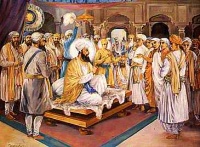Template:AOW228: Difference between revisions
Hari singh (talk | contribs) (Created page with '{{aowh|Pandit Kirpa Ram}} thumb|250px|right|Pandit Kirpa Ram '''Pandit Kirpa Singh Dutt''' (d. 1705) was the son of Bhai Aru Ram, a Sarasvat Brahman of...') |
Hari singh (talk | contribs) No edit summary |
||
| (5 intermediate revisions by the same user not shown) | |||
| Line 1: | Line 1: | ||
{{aowh|[[Pandit Kirpa Ram]]}} | {{aowh|[[Pandit Kirpa Ram]]}} | ||
[[Image:Pkr.jpg|thumb| | [[Image:Pkr.jpg|thumb|200px|right|{{c|'''[[Pandit Kirpa Ram]]'''}}]] | ||
'''[[Pandit Kirpa Singh Dutt]]''' (d. 1705) was the son of Bhai Aru Ram, a Sarasvat | '''[[Pandit Kirpa Singh Dutt]]''' (d. [[1705]]) was the son of Bhai Aru Ram, a Sarasvat [[Brahmin]] of Matan, 65 Km east of [[Srinagar]], in [[Kashmir]]. Aru Ram had met [[Guru Har Rai]] and sought his blessing at the time of the latter's visit to Kashmir in [[1660]]. | ||
A group of Kashmiri | A group of Kashmiri brahmins came to [[Guru Tegh Bahadar]] at [[Anandpur sahib]] in '''[[May]] [[1675]]''' to seek the Guru's protection against atrocities of [[Aurungzeb]]. Kirpa Ram led this group of [[Kashmiri]] [[Pandit]]s (educated scholars) driven to dire straits by the State persecution of non-Muslims. | ||
They had faced stiff taxes, atrocities, cruelty and repression under the [[Mughal]] governor of Kashmir. Honour of their daughters was being lost and they were losing their religion to the fanatic zeal and proselytization activities of Islamic crusaders. | |||
[[Guru Tegh Bahadar]] whose help the visitors sought asked them to go and have it communicated to the Emperor, ''If he can get (Guru Tegh Bahadur) to convert to Islam, then they would all voluntarily accept conversion''. Kirpa Ram and his companions sent to Emperor Aurungzeb a petition to that effect through Zalim Khan, a governor of | [[Iftikhar Khan]], governor of Kashmir ([[1671]]-[[1675]]) was a harsh man and was making forcible conversion to Islam of all non-Muslims. The Kashmiri Brahmins asked the Guru for a solution. Guru replied "Such activities can only be stopped by the sacrifice of a great person". | ||
Just then 8 years old son of [[Guru Tegh Bahadar]], [[Gobind Rai]] (later named [[Gobind Singh]]) walked into the meeting to find his father lost deep in thoughts. <!-----He enquired about the reason. He offered a possible solution by saying "who else is greater then you, O father". [[Guru Tegh Bahadar]] knew immediately about his mission and Dharma. He told Kashmiri Brahmins, ''Go tell Aurungzeb that if they can convert your Guru then you will all become Muslims''. Kirpa Ram obliged and Aurungzeb issued a summons for Guru ji. | |||
[[Guru Tegh Bahadar]] whose help the visitors sought asked them to go and have it communicated to the Emperor, ''If he can get (Guru Tegh Bahadur) to convert to Islam, then they would all voluntarily accept conversion''. Kirpa Ram and his companions sent to Emperor Aurungzeb a petition to that effect through Zalim Khan, a governor of [[Lahore]]. Then followed by imperial summons, and [[Guru Tegh Bahadur]]'s arrest and Martyrdom in Delhi. Shaheedi of Nanak 9 Kirpa Ram returned to [[Anandpur]]. [[Guru Gobind Singh]] ji from 1675 until 1690 took an extensive courses in [[Sanskrit]], '''Persian, Arabic''', and [[Punjabi]] in educating himself.----->{{aowf|Pandit Kirpa Ram}} | |||
Latest revision as of 21:53, 3 May 2012
Pandit Kirpa Singh Dutt (d. 1705) was the son of Bhai Aru Ram, a Sarasvat Brahmin of Matan, 65 Km east of Srinagar, in Kashmir. Aru Ram had met Guru Har Rai and sought his blessing at the time of the latter's visit to Kashmir in 1660.
A group of Kashmiri brahmins came to Guru Tegh Bahadar at Anandpur sahib in May 1675 to seek the Guru's protection against atrocities of Aurungzeb. Kirpa Ram led this group of Kashmiri Pandits (educated scholars) driven to dire straits by the State persecution of non-Muslims.
They had faced stiff taxes, atrocities, cruelty and repression under the Mughal governor of Kashmir. Honour of their daughters was being lost and they were losing their religion to the fanatic zeal and proselytization activities of Islamic crusaders.
Iftikhar Khan, governor of Kashmir (1671-1675) was a harsh man and was making forcible conversion to Islam of all non-Muslims. The Kashmiri Brahmins asked the Guru for a solution. Guru replied "Such activities can only be stopped by the sacrifice of a great person".
Just then 8 years old son of Guru Tegh Bahadar, Gobind Rai (later named Gobind Singh) walked into the meeting to find his father lost deep in thoughts. .....More

